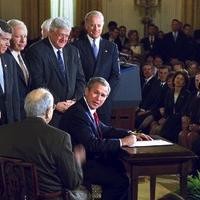On Oct. 16, 2002, President Bush signed the Authorization for the Use of Military Force Against Iraq Resolution into law. But six years later, neither the political left nor the political right has internalized the key lessons we should have learned from the run up to the Iraq War. Both Sen. Obama and Sen. McCain deserve credit: Obama for his skepticism and opposition to the war in 2002 and 2003, McCain for supporting the Surge which has helped make the decision to invade Iraq marginally less disastrous than it appeared in 2006. But the debate over those two questions this election season has served to obscure the question we ought to have asked ourselves in the first place: What would an effective policy towards Iraq have looked like? It is a question that should also inform our approach towards countries like North Korea and Venezuela that also pose ongoing challenges to American foreign policy. Let's go back to 2002. Iraq was ruled by Saddam Hussein, who had expelled weapons inspectors four years before, in 1998. The United States was maintaining no-fly zones over both northern and southern Iraq, a costly military operation that routinely resulted in threats to American aircraft and retaliation against Iraqi ground installations. The Iraqi people suffered from the effects of a decade of sanctions. To put it simply, the situation was a mess, and a genuine policy challenge. So, what should we have done about it?
Rethinking the 2002 Iraq War Resolution

